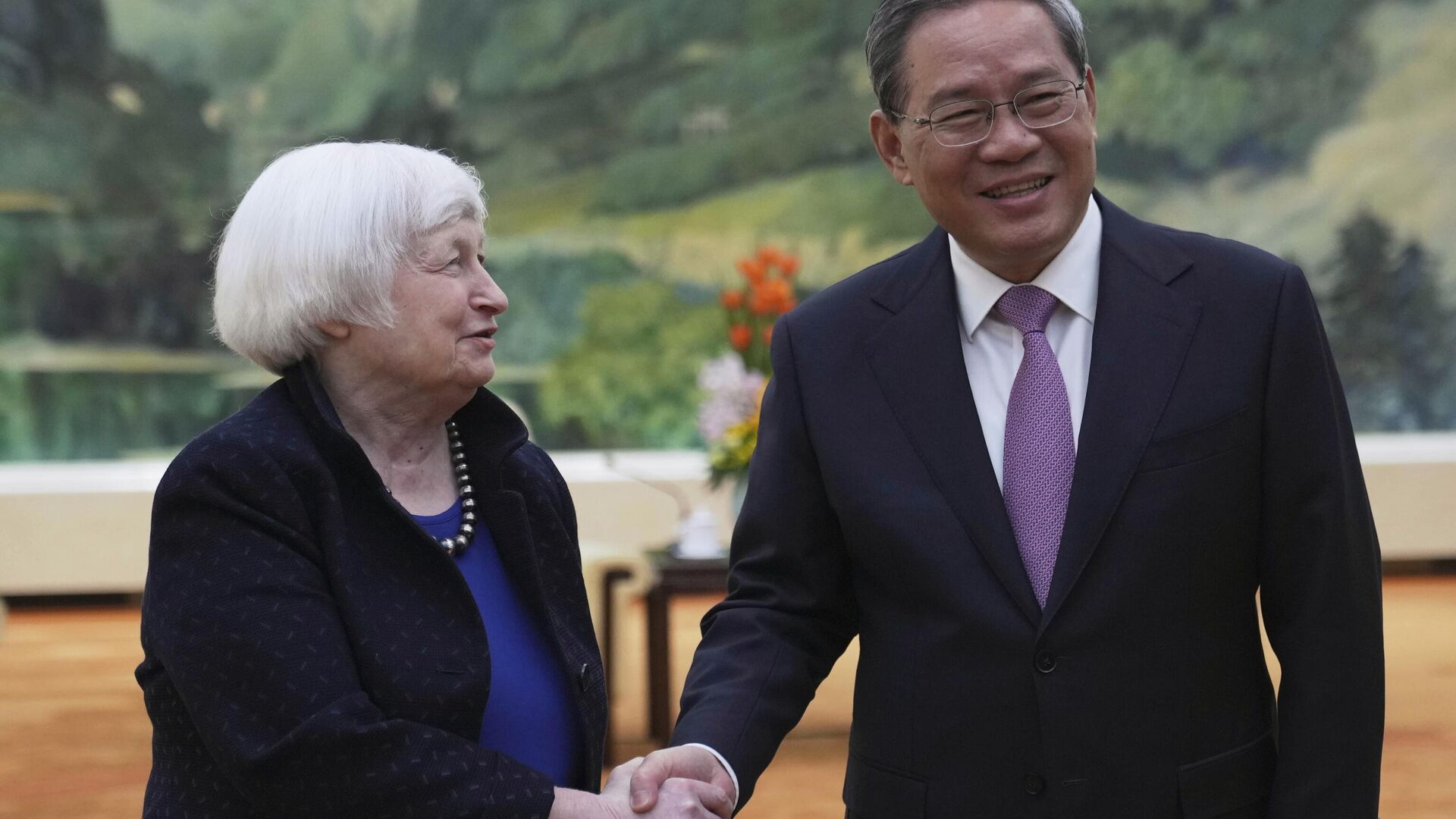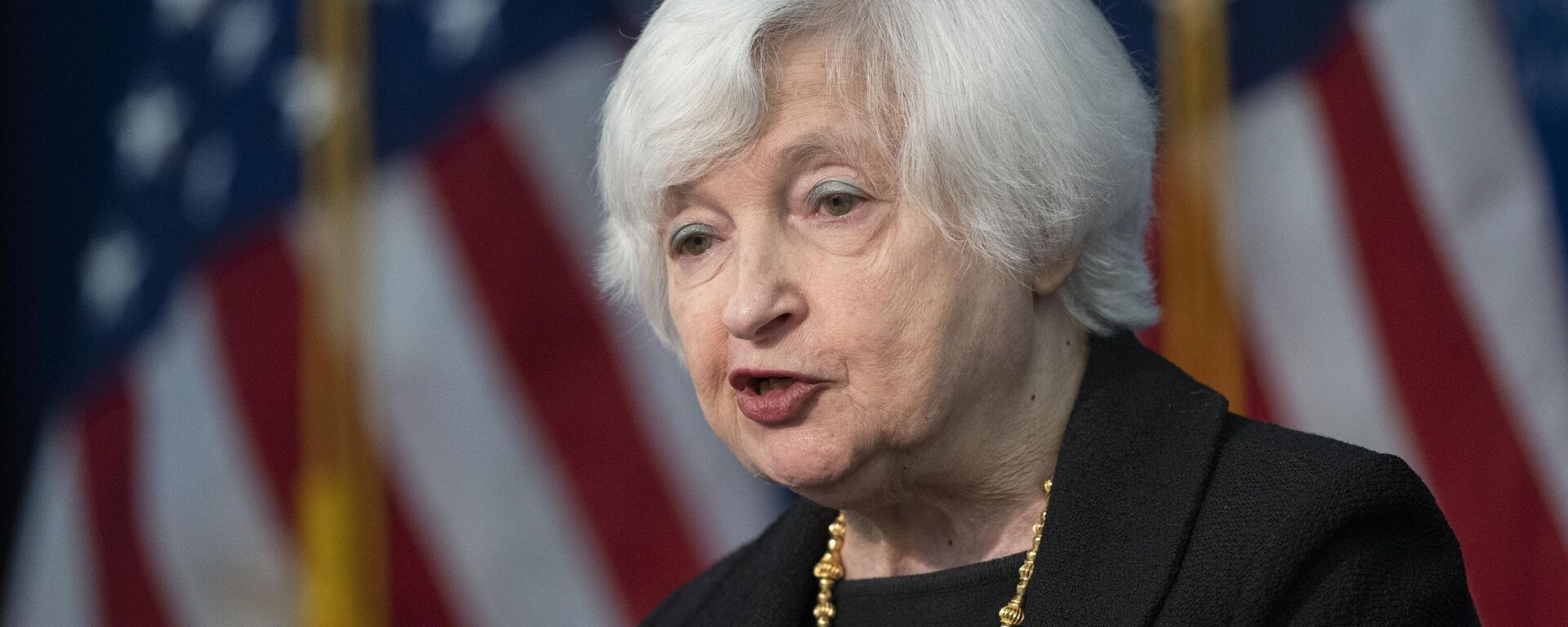https://sputnikglobe.com/20240409/china-calmly-responds-to-us-lecturing-on-trade-during-treasury-secretarys-visit-1117819870.html
China Calmly Responds to US Lecturing on Trade During Treasury Secretary's Visit
China Calmly Responds to US Lecturing on Trade During Treasury Secretary's Visit
Sputnik International
Both Chinese Premier Li Qiang and Yellen said relations between the US and China are “stabilizing,” but caution that a number of issues remain unresolved.
2024-04-09T04:49+0000
2024-04-09T04:49+0000
2024-04-09T05:10+0000
analysis
china
economy
janet yellen
trade
us-china trade war
us-china relations
https://cdn1.img.sputnikglobe.com/img/07e8/04/09/1117820061_0:161:3070:1888_1920x0_80_0_0_5d5e653e448b9bcaf721b27b09de23a9.jpg
According to a recent report from RT, Beijing urged the White House not to politicize bilateral trade and to abide by “basic norms” of the market economy.The report follows US Treasury Secretary Janet Yellen’s visit to China Sunday. Both Chinese Premier Li Qiang and Yellen said relations between the US and China are “stabilizing” but cautioned that a number of issues remain unresolved."It is hoped that the US will abide by the basic norms of market economy including fair competition and open cooperation, refrain from turning economic and trade issues into political or security issues, and view the issue of production capacity objectively and dialectically from a market-oriented and global perspective,” the premier told Yellen during the meeting.Radhika Desai spoke with Sputnik’s The Critical Hour Monday about the economic relationship between China and the US. Desai is an author and professor at the Department of Political Studies and director of the Geopolitical Economy Research Group at the University of Manitoba, Winnipeg, Canada.“And China is also absolutely right that what the US is doing is turning economic and trade issues into political and security issues,” she continued. “China is asking the US to look at the issue of productive capacity objectively and dialectically. Basically, they’re asking the US officials to take, shall we say, a Marxist view of these things, because at the end of the day, dialectics is all about Marxism.”“But I think underlying this, there is another level which is entirely serious,” the author said. “And this has to do with the fact that what China means by free trade and even globalization is something different from what the US and most of the West mean by it.”“So, yes, one should have free trade, but third world countries are allowed to pursue industrial policy. They are allowed to develop their industries because, you know, if you look at the history of industrialization, no country has industrialized without a certain degree of state involvement and certainly very high degree of state involvement, a certain degree of protection, a certain degree of industrial policy, a certain degree of subsidies, you name it. The whole slew of measures were used by the US, Germany, Japan in its day, even by the UK, in order to industrialize.”Sputnik’s Garland Nixon addressed the irony of Yellen's visit to China, as the US is lecturing a nation experiencing economic success on the subject.“On the other hand, other US corporations were threatened by China, for example, Google and Meta and so on,” she added. “They want the US to, essentially, wage war against China, hybrid war, military war, everything war. And, of course, the US military industrial complex has its own reasons to do that. So, essentially, the US state is being pulled and pushed in every kind of direction vis-a-vis China and it can't really produce a coherent policy.”Leon then asked the professor for comment on the upcoming US presidential election as it related to the country’s economic ties with China. Desai suggests that both Republicans and Democrats use China as a scapegoat for the economic hardships their policies have created.“What we are looking at is a situation in which ordinary people are suffering because of the policies pursued by the US administration, policies that were one-sided [and] in favor of US corporations, so much so that they coddle US corporations and US corporations are not even required to be efficient or competitive,” she explained.“So, essentially, they are accorded to the extent that they have become royalty corporations, their income is no longer earned or most of it is not earned, in any reasonable understanding of the term. So these policies are leading to the repeat suffering of the people.”
https://sputnikglobe.com/20240318/chinas-infrastructure-triumphs-prove-west-has-much-to-learn-from-beijing-1117395791.html
https://sputnikglobe.com/20240328/chinas-cheap-green-imports-hurts-us-economy-white-house-reportedly-laments-1117595983.html
https://sputnikglobe.com/20240224/china-making-ai-breakthroughs-despite-bidens-sanctions-1116956025.html
china
Sputnik International
feedback@sputniknews.com
+74956456601
MIA „Rossiya Segodnya“
2024
News
en_EN
Sputnik International
feedback@sputniknews.com
+74956456601
MIA „Rossiya Segodnya“
Sputnik International
feedback@sputniknews.com
+74956456601
MIA „Rossiya Segodnya“
china, us, trade, yellen, us-china trade wars, economy
china, us, trade, yellen, us-china trade wars, economy
China Calmly Responds to US Lecturing on Trade During Treasury Secretary's Visit
04:49 GMT 09.04.2024 (Updated: 05:10 GMT 09.04.2024) Yellen’s visit to China marks the first high-profile meeting between the two nations since US President Joe Biden hosted Chinese leader Xi Jinping in November. Relations between China and the US remain strained on issues such as trade, Taiwan and the South China Sea, as well as Beijing's growing relationship with Moscow.
According to a recent
report from RT, Beijing urged the White House not to politicize bilateral trade and to abide by “basic norms” of the market economy.
The report follows US Treasury Secretary Janet Yellen’s visit to China Sunday. Both Chinese Premier Li Qiang and Yellen said relations between the US and China are “stabilizing” but cautioned that a number of issues remain unresolved.
"It is hoped that the US will abide by the basic norms of market economy including fair competition and open cooperation, refrain from turning economic and trade issues into political or security issues, and view the issue of production capacity objectively and dialectically from a market-oriented and global perspective,” the premier told Yellen during the meeting.
Radhika Desai spoke with
Sputnik’s The Critical Hour Monday about the economic relationship between China and the US. Desai is an author and professor at the Department of Political Studies and director of the Geopolitical Economy Research Group at the University of Manitoba, Winnipeg, Canada.
“The Chinese are pointing out that after decades of banging on about the virtues of the free market and globalization, the US, thanks to its own internal problems, is now being forced to talk about protection and tariffs and industrial policy and subsidies and all those things which it has in the past asked other countries not to do,” Desai said in response to the meeting.
“And China is also absolutely right that what the US is doing is turning economic and trade issues into political and security issues,” she continued. “China is asking the US to look at the issue of productive capacity objectively and dialectically. Basically, they’re asking the US officials to take, shall we say, a Marxist view of these things, because at the end of the day, dialectics is all about Marxism.”
“But I think underlying this, there is another level which is entirely serious,” the author said. “And this has to do with the fact that what China means by free trade and even globalization is something different from what the US and most of the West mean by it.”
“When we talk about free trade and globalization in Western countries, we basically talk about essentially rolling back the state and allowing the free play of market forces both within the country and internationally,” she added. “Whereas historically, China has taken an interpretation of all of these terms, which is essentially modified by a consideration or with an eye to the development needs of third world countries.”
“So, yes, one should have free trade, but third world countries are allowed to pursue industrial policy. They are allowed to develop their industries because, you know, if you look at the history of industrialization, no country has industrialized without a certain degree of state involvement and certainly very high degree of state involvement, a certain degree of protection, a certain degree of industrial policy, a certain degree of subsidies, you name it. The whole slew of measures were used by the US, Germany, Japan in its day, even by the UK, in order to industrialize.”
“All China is doing is saying, ‘we should be allowed to do this, otherwise it's actually not a level playing field.’”
Sputnik’s Garland Nixon addressed the irony of Yellen's visit to China, as the US is lecturing a nation experiencing economic success on the subject.
“The last couple of days have particularly manifested the inner tension of US policy towards China,” Desai suggested. “The US ruling classes and therefore the US government are deeply split about China. On the one hand, after decades of relying on China to essentially produce things for them, the US corporations need to have an ongoing relationship with China.”
“On the other hand, other US corporations were threatened by China, for example, Google and Meta and so on,” she added. “They want the US to, essentially, wage war against China, hybrid war, military war, everything war. And, of course, the US military industrial complex has its own reasons to do that. So, essentially, the US state is being pulled and pushed in every kind of direction vis-a-vis China and it can't really produce a coherent policy.”
“But, quite frankly,” Desai continued, “the Chinese have never shut the diplomatic doors. They will always keep it open. They will say 'yes, Madam Yellen, if you want to talk, we will talk some more.' So Yellen is returning with a promise to talk, but that promise to talk, she didn't have to go to Beijing to elicit it.”
Leon then asked the professor for comment on the upcoming US presidential election as it related to the country’s economic ties with China. Desai suggests that both Republicans and Democrats use China as a scapegoat for the economic hardships their policies have created.
“What we are looking at is a situation in which ordinary people are suffering because of the policies pursued by the US administration, policies that were one-sided [and] in favor of US corporations, so much so that they coddle US corporations and US corporations are not even required to be efficient or competitive,” she explained.

24 February 2024, 18:50 GMT
“So, essentially, they are accorded to the extent that they have become royalty corporations, their income is no longer earned or most of it is not earned, in any reasonable understanding of the term. So these policies are leading to the repeat suffering of the people.”
“But precisely because there is a bipartisan agreement on these policies, neither party is going to talk about what's wrong with them. And that is why China, pointing to China as a source of the misery of the ordinary people has also become a cross-party consensus,” said Desai. “That's why Biden continued Trump's policies and Trump won the election by scapegoating China. And Biden continued his policies. I don't think we're going to see anything different at this point.”





